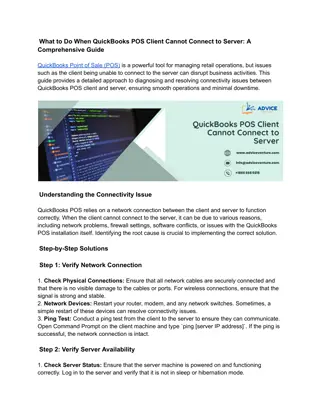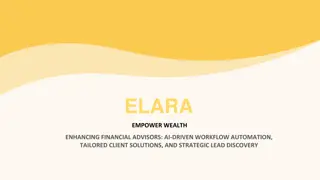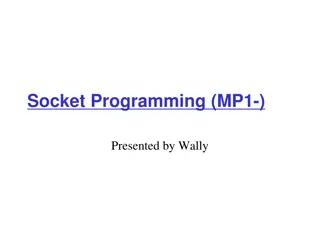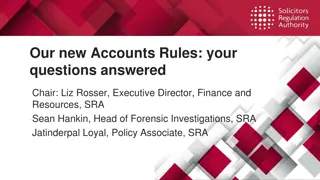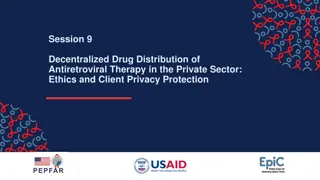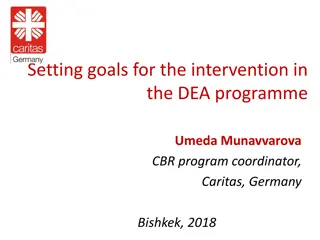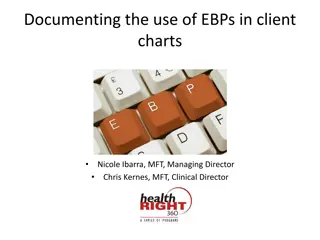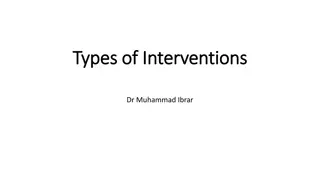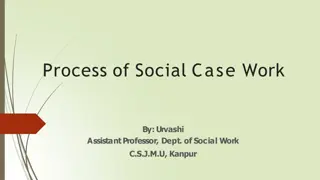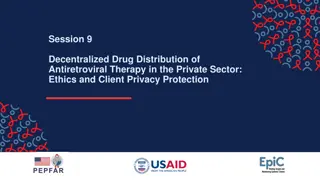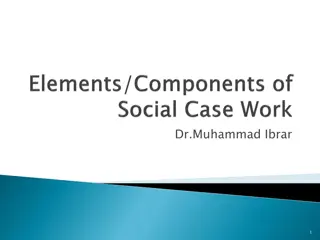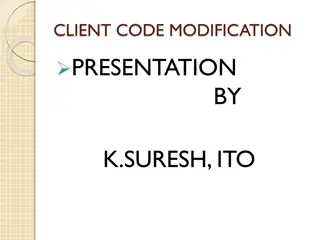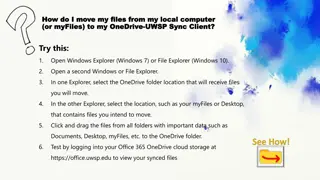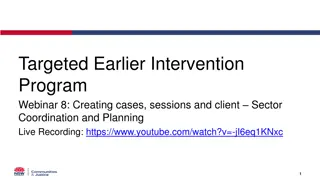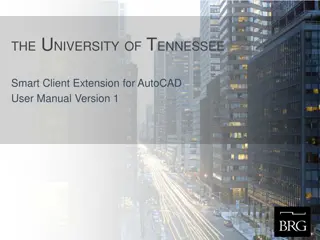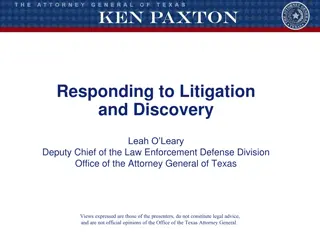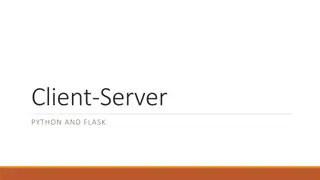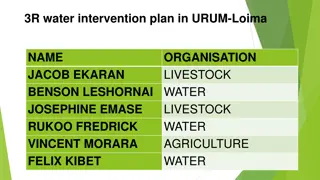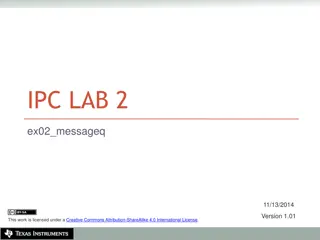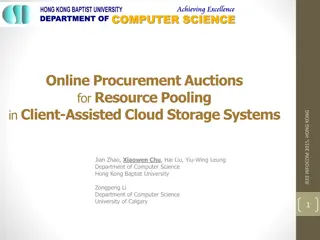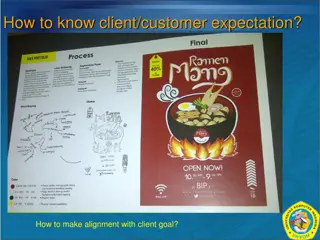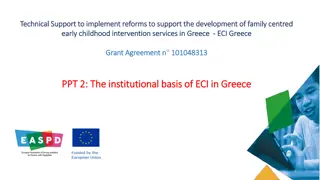Enhancing Customer Loyalty with UNIO's Real Infrastructure of Client Benefits
UNIO offers a comprehensive infrastructure of client benefits and motivation to increase customer loyalty. Their system includes unique features such as money-back promotions, prizes, and a lower client migration rate. By working alongside international loyalty systems and partnering with NEO Bank U
0 views • 7 slides
Best 10 Strategies to Build Effective Client Relationship Management
Building effective client relationship management (CRM) is crucial for businesses to foster lasting connections with their clients. Let\u2019s explore 10 strategies that can help you create meaningful and enduring relationships with your clients:\n\/\/homedecorationstyle.mypagecloud.com\/blog\/best-
2 views • 12 slides
What to Do When QuickBooks POS Client Cannot Connect to Server_ A Comprehensive Guide
Struggling with QuickBooks POS client connectivity issues? Our comprehensive guide offers detailed steps to resolve problems when QuickBooks POS client cannot connect to the server. Learn how to check network connections, configure firewall settings, and verify server configurations to restore seaml
1 views • 3 slides
Revolutionizing Financial Advising with Elara: AI-Driven Solutions for Wealth Enhancement
Elara is an AI-powered assistant revolutionizing financial advising by streamlining operations, improving client engagement, and accelerating lead generation for wealth managers. With a focus on automation and personalization, Elara addresses challenges faced by financial advisors, leveraging data f
2 views • 12 slides
Algorithms and Issues in Client Software Design
Explore the fundamentals of client software design, including the underlying algorithms, client architecture, and methods for identifying server locations. Learn how applications become clients, interact with TCP/IP protocols, and simplify client-side operations compared to server software.
6 views • 49 slides
Introduction to Socket Programming for Client/Server Applications
Gain insights into socket programming for building client/server applications that communicate using the Socket API. Explore the fundamentals of TCP sockets, application layers, terminology, and client/server socket interactions. Understand how sockets serve as doors between application processes an
5 views • 15 slides
New Accounts Rules and Client Money Safeguarding Overview
Explore the latest SRA Accounts Rules introduced on 25th November, emphasizing clearer standards, a revised definition of client money, and requirements for safeguarding and managing client funds. Understand the obligations and key considerations in handling client money to ensure compliance and fin
1 views • 26 slides
Ensuring Client Privacy and Ethics in Antiretroviral Therapy Distribution
This content discusses the ethical principles, definitions of privacy and confidentiality, and the importance of maintaining client information confidential in decentralized drug distribution of antiretroviral therapy in the private sector. It emphasizes the need to protect sensitive information and
1 views • 10 slides
Client-Server Architecture
Client-server architecture is a computing model where a central server hosts and manages resources and services for client computers over a network. There are different types of clients and servers, each with unique characteristics and roles. This architecture offers various advantages and disadvant
3 views • 15 slides
Intervention Boosting Self-Efficacy Among Adolescents Challenging Discrimination
Adolescents challenging discrimination through a perspective-taking and action-planning intervention showed increased self-efficacy, particularly among White participants. The intervention, which included facilitated discussion sessions, led to positive outcomes and highlighted the importance of bys
0 views • 7 slides
Boosting Self-Efficacy in Adolescents: Intervention Study
Adolescents challenged discrimination through a perspective-taking and action-planning intervention, leading to increased self-efficacy, especially among White participants. The intervention involved facilitated discussions, self-disclosure, and sharing experiences to empower adolescents to interven
1 views • 7 slides
Effective Intervention Planning for Rehabilitation Services
The intervention in the DEA programme involves a thorough assessment of user needs, formulation of objectives, and planning based on case management technology. The cycle includes assessment, planning, and actual intervention. Prioritizing high-priority problems is essential for effective outcomes.
1 views • 13 slides
Effective Documentation of Evidence-Based Practices in Client Charts
Proper documentation in client charts is vital for tracking treatment progress and ensuring quality care. The Golden Thread method helps connect assessment, diagnosis, treatment plans, and progress notes, creating a cohesive treatment story. Progress notes should detail session topics, client progre
0 views • 14 slides
Different Types of Interventions to Address Addiction Challenges
Every individual's addiction story is unique, requiring different types of interventions tailored to their specific needs. This article explores four popular intervention approaches - simple intervention, classical intervention, family system intervention, and crisis intervention - each designed to
1 views • 7 slides
The Process of Social Case Work in Social Work Practice
Social case work involves a systematic process where a client seeks professional help through a case worker. This process begins with intake, where the client's needs and problems are assessed, followed by a psycho-social study to understand the client's adaptation to stress. The case worker probes
1 views • 24 slides
Ensuring Client Privacy and Confidentiality in Antiretroviral Therapy Distribution
This session emphasizes the importance of upholding client privacy and confidentiality in the decentralized distribution of antiretroviral therapy in the private sector. It covers ethical considerations, principles, definitions of privacy and confidentiality, and the significance of safeguarding cli
0 views • 10 slides
Social Case Work: Elements and Process
Social case work, as defined by H.H. Perlman, is a process used by human welfare agencies to assist individuals in coping with problems in social functioning. The fundamental elements include the person/client, problem, agency, process, and professional representative (social worker). The client, wh
0 views • 14 slides
Principles of Effective Client-Worker Relationship in Social Work
Understanding the principles of acceptance, communication, individualization, participation, confidentiality, self-awareness, and self-discipline is vital in establishing a positive client-worker relationship in social work. The initial interaction between the client and worker sets the tone for mut
0 views • 11 slides
NFP Private Client Group Umbrella Program Overview
NFP is a leading insurance broker and consultant offering a range of services including employee benefits, property & casualty, retirement, individual insurance, and wealth management solutions. The Private Client Group focuses on personal insurance for individuals, offering full benefits, competiti
1 views • 26 slides
Client Code Modification and Tax Evasion: Regulatory Issues in Stock Exchanges
Client Code Modification (CCM) is a service provided by Stock Exchanges to rectify errors in client codes during trading hours, but it has been misused for tax evasion by some brokers. Investigations revealed significant modifications leading to tax evasion. Regulatory bodies like SEBI and CBDT have
0 views • 41 slides
Move Files to OneDrive Using UWSP Sync Client
Learn how to easily move files from your local computer to OneDrive using the UWSP Sync Client. Follow step-by-step instructions with visual aids, ensuring a smooth transfer process. Verify the presence of the Sync Client icon and get started organizing your files efficiently.
0 views • 14 slides
Effective Sector Development Strategies for Client Intervention Programs
This webinar series delves into recording sector development activities, understanding the Data Exchange tool, and effectively managing cases, sessions, and clients for targeted intervention programs. Learn how to differentiate between individual clients and unidentified group clients, and optimize
0 views • 20 slides
Client Data Upload Process Overview for MOHCD Grantees
In this guidance, learn about the process of uploading client data for MOHCD grantees. Understand the required fields, common errors, and how to troubleshoot template issues. Follow step-by-step instructions for successful client data uploads using the Data Upload Tool. Ensure accuracy and completen
0 views • 11 slides
Client-Side Tips & Tricks for RadControls for ASP.NET AJAX
Discover the client-side functionality offered by RadControls for ASP.NET AJAX, empowering developers to create high-performing web applications. Learn about client-side basics, common features, events, data binding, jQuery integration, and more.
0 views • 25 slides
Regret-Bounded Vehicle Routing Approximation Algorithms
Regret-bounded vehicle routing problems aim to minimize client delays by considering client-centric views and bounded client regret measures. This involves measuring waiting times relative to shortest-path distances from the starting depot. Additive and multiplicative regret measures are used to add
0 views • 28 slides
Configuring Smart Client Extension for AutoCAD User Manual
Learn how to configure the Smart Client Extension for AutoCAD with easy-to-follow steps. Set preferences for linking facilities drawings to databases, configure AutoCAD, and enable Smart Client Extensions for multiple applications. Enhance your workflow and maximize efficiency with this comprehensiv
0 views • 15 slides
Effective Collaboration Between Client Agency and Litigation Counsel
Establishing clear expectations, defining roles, and facilitating communication are crucial in developing a successful working relationship between a client agency and litigation counsel. This collaboration ensures efficient handling of evidence, response to discovery requests, and communication wit
0 views • 22 slides
Client-Server Communication with Flask in Python
Explore the basics of implementing a client-server architecture using Flask in Python. Learn how to set up a server, create APIs, and interact with a client application. The process involves handling API calls, directing requests, and returning data to the client through the server.
1 views • 10 slides
Mitigating Client Frame Tracking in IEEE 802.11 Networks
Unencrypted and predictable frame fields in IEEE 802.11 networks can lead to client frame tracking, compromising user privacy. The Client Frame Tracking Countermeasures (CFTC) proposal aims to prevent tracking across epoch boundaries by obfuscating critical fields like PN, SN, and AID. Each epoch, l
0 views • 17 slides
Conducting an Initial Interview with a Family Law Client for Accreditation
This simulated first interview aims to assess the candidate's ability in interacting with a client, taking instructions, giving advice, and developing an initial plan in the context of family law. Key assessment criteria include gathering and assessing instructions, giving advice, demonstrating rapp
0 views • 54 slides
Water Intervention Plan in Urum-Loima Region
This water intervention plan in the Urum-Loima region focuses on addressing water gaps and potential zones for groundwater exploration. It includes related interventions such as open water storage and sand dams to meet current and future water demands for domestic, livestock, and agricultural use. T
0 views • 9 slides
Effective Client Management and Public Relations in Veterinary Practice
Proper client management and effective public relations are crucial in veterinary practice for ensuring the well-being of animals. Establishing a strong veterinarian-client-patient relationship, maintaining patient records, and upholding principles of veterinary ethics are essential for providing qu
0 views • 24 slides
IPC Lab 2 MessageQ Client/Server Example
This MessageQ example demonstrates the client/server pattern using SYS/BIOS heap for message pool, anonymous message queue, and return address implementation. The example involves two processors - HOST and DSP, where the DSP processor acts as the server creating a named message queue, and the HOST p
0 views • 12 slides
Online Procurement Auctions for Resource Pooling in Client-Assisted Cloud Storage Systems
This study explores the use of online procurement auctions in client-assisted cloud storage systems to improve resource pooling and manage cloud outages. It discusses the benefits of client assistance, cloud storage services, common cloud outages, and potential solutions like Cloud Federation and Cl
0 views • 27 slides
Ethical Considerations in Changing Client Representation between Governmental Entities
This presentation focuses on ethical considerations when transitioning client representation from one governmental entity to another, emphasizing the importance of informed consent, confidentiality, and avoiding conflicts of interest. Rule 1.9(c) plays a key role in regulating the use of former clie
0 views • 8 slides
Enhance Client Relationships and Boost Productivity with CloudRadial Webinar
Client relationships are crucial in business, starting from the first sales call. Join the CloudRadial webinar to learn how to land, onboard, manage, and grow clients effectively. Discover tools to shift to a partnership-based mindset, address fears, and improve communication. Gain insights on trans
0 views • 8 slides
Attorney-Client Privilege
Privilege in law refers to the right to block certain evidence from being admitted in a case, even if it is relevant. Attorney-client privilege, like the one defined in Texas Rule 503, allows individuals consulting a lawyer for legal advice to keep their discussions confidential. Exceptions to this
0 views • 54 slides
Client Expectations and Aligning with Business Goals
Effective strategies for understanding client/customer expectations and aligning them with business goals are crucial for success in IT-Design projects. By focusing on the client's needs and vision, IT professionals can elevate design value, improve timing and production processes, and aim for compr
0 views • 33 slides
Supporting Family-Centered Early Childhood Intervention Services in Greece
The grant agreement aims to implement reforms supporting the development of family-centered early childhood intervention services in Greece. It emphasizes the human rights and child rights framework, highlighting the legal and political basis of early childhood intervention in the country. The conte
0 views • 7 slides
Impact of Nurse-Midwife Intervention on Maternal and Neonatal Health
This study examines the sustained impact of a nurse-midwife intervention on maternal and neonatal health outcomes following an academic partnership between University of California San Francisco and Abwenzi Pa Za Umoyo. The intervention, which included intensive training and longitudinal mentorship,
0 views • 17 slides


